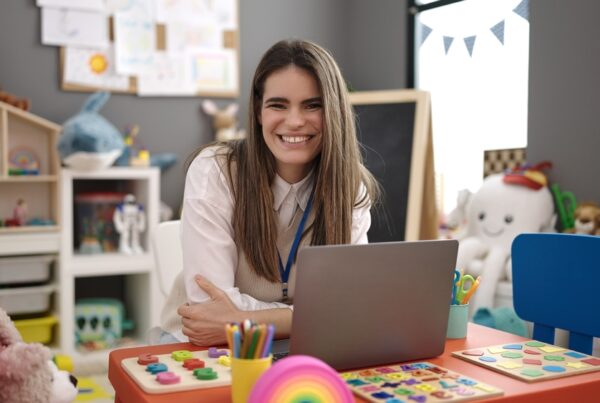Some of the most critical areas of learning in early childhood include speech, language and communication. These skills are used on a daily basis for the entirety of our lives.

Speech, language and communication skills are the foundation of healthy relationships, and help us to make sense of our experiences, communicate our emotions and needs, and much more.
However, according to research from 2018, around 21.7 per cent of Australian five-year-olds were not developmentally prepared for school upon reaching schooling age.
Events such as the COVID-19 pandemic have not helped children either, some of which have fallen even further behind in their literacy development.
This is why it’s so critical that both early years educators, and parents and guardians play a part in helping to nurture these skills.
Below, we’ll explore the importance of speech and language development in childhood.
Why is speech and language development important?
We’ve brushed on the importance of speech and language development above, but here’s a more in-depth look at the reasons behind the theory.
The benefits associated with ensuring that we nurture speech and language include:
- Building a strong foundation for the rest of their academic career. Learning to communicate is a key building block in learning to read, communicate with others in the classroom, and understand new concepts
- Developing strong communication skills, which is key to forming new relationships and maintaining existing ones. It’ll be a driver in your child’s success in terms of making friends
- Performing well in future studies. A child’s proficiency in speech and language can be a predictor of their future academic success, according to numerous studies
- Communicating their emotions and needs more easily, which can reduce frustration and negative behaviour associated with it
How to support speech and language development in the early years
Below, we’ve listed some strategies that you can use to help develop speech and language in your children, or the children that you look after as an educator.
1. Champion good communication skills
Children learn so much from the adults around them, and you need to make sure that you’re showing the behaviours you’d like them to develop. Here are a few:
Focus on shorter sentences
Don’t overburden children with lengthy, complex sentences that can be hard for them to follow.
Be patient and speak slowly
This’ll give children the time to process the information and understand what you’re talking about more easily.
Use the environment
Gesture to objects around you and give them a name, constantly building their vocabulary and awareness of the world around them.
Listen attentively when children speak
Give children your undivided attention when they’re talking to you, rather than trying to multitask, as much as possible.
Make eye contact when speaking and listening
If necessary, lower yourself to their level. You’ll be modelling good communication skills for them to follow.
Try to avoid speaking in fragments or with poor grammar
As much as possible, pronounce every word, and try to avoid colloquialisms, such as “wanna” over “want to.” Remember, they’re going to copy a lot of your habits, so you want to emphasise proper sentence structure and pronunciation.

2. Read to Your Children
Reading to children in their early years can have a vast impact on the development of their speech and language skills.
According to the Australian Institute of Health and Welfare (AIHW), in 2017, around 4 in 5 children were regularly read to by their parents at least three times per week.
Three times per week is an admirable achievement, but if you have the time, you can read to children every day for an even greater impact.
You should make an effort to pronounce each word, and point to each word as you speak it.
As your child grows older, you can engage them in a discussion about their books.
You can ask them to predict the next scene in the story, ask them about their favourite foods, hobbies or music, and talk about words they haven’t encountered before.
3. Take the Time to Talk
While setting aside time for structured activities like reading is great, it’s also important to talk together regularly.
Every interaction with a child can help to further their language development, and it gives them unique opportunities to practice speech.
Even before a child can speak for themselves, you should be talking to them as much as possible. So, think about the following pointers:
- Avoid using direct criticisms. You shouldn’t avoid correcting mistakes; after all, you’re trying to help the children develop good communication skills. But rather than directly pointing them out, you can parrot your child’s sentence back at them with the correct structure or form of the phrase. For example, correcting “he take my ball” to “he took your ball.” Over time, they’ll learn from your corrections.
- Expand on children’s’ sentences or individual words. Even if a child has only mastered short sentences of a few words, you can expand on them to encourage their proficiency and confidence. If a child says “ball,” you can respond with, “Wow, he can kick that ball far, can’t he?”
- Use a high-pitched voice for infants. Very young children are more likely to listen to what you’re saying when you use a high-pitched voice, also known as baby talk. Official guidance from the NHS advises use of a high-pitched voice to communicate with babies. It’s not simply a cutesy habit from parents; there’s actual science behind it!
- Narrate yours and the children’s actions. There’s something called ‘parallel talk’ which revolves around narrating what a child is doing. This might include commenting on their choice of clothing, talking about what they’re doing or what they’re eating, for example. You can also use ‘self-talk, which involves the same, but focused on your own actions.
There are many other ways to encourage development of speech and language in children. Here’s a quick snapshot of some of the other methods you can use:
- Singing songs with children to expand their vocabularies, while building their confidence and their understanding of rhyme and intonation.
- Playing games to work on descriptive and predictive skills, while learning about etiquette. This’ll help with their adjectives and other vocabulary, while also helping them to understand turn taking and the importance of fair behaviour with others.
- Encouraging roleplay and imaginary play to help develop their imagination. This could be anything from dressing up as much-loved characters from a book or movie, to participating in a school performance.

Helping children with speech development can be fun!
Remember, while speech and language development is very important, it’s also a natural development. So have fun with it! Narrating everyday situations, playing peek a boo, reading picture books and playing with other children are all effective and fun ways for children to develop their language skills.









